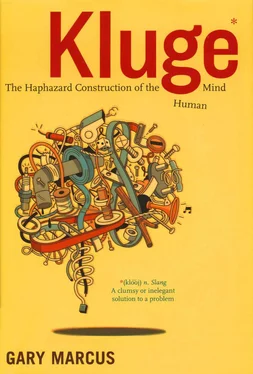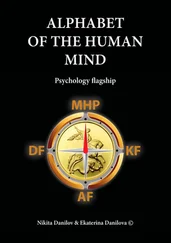Gary Marcus - Kluge - The Haphazard Construction of the Human Mind (Houghton Mifflin; 2008)
Здесь есть возможность читать онлайн «Gary Marcus - Kluge - The Haphazard Construction of the Human Mind (Houghton Mifflin; 2008)» весь текст электронной книги совершенно бесплатно (целиком полную версию без сокращений). В некоторых случаях можно слушать аудио, скачать через торрент в формате fb2 и присутствует краткое содержание. Жанр: Старинная литература, на английском языке. Описание произведения, (предисловие) а так же отзывы посетителей доступны на портале библиотеки ЛибКат.
- Название:Kluge: The Haphazard Construction of the Human Mind (Houghton Mifflin; 2008)
- Автор:
- Жанр:
- Год:неизвестен
- ISBN:нет данных
- Рейтинг книги:3 / 5. Голосов: 1
-
Избранное:Добавить в избранное
- Отзывы:
-
Ваша оценка:
- 60
- 1
- 2
- 3
- 4
- 5
Kluge: The Haphazard Construction of the Human Mind (Houghton Mifflin; 2008): краткое содержание, описание и аннотация
Предлагаем к чтению аннотацию, описание, краткое содержание или предисловие (зависит от того, что написал сам автор книги «Kluge: The Haphazard Construction of the Human Mind (Houghton Mifflin; 2008)»). Если вы не нашли необходимую информацию о книге — напишите в комментариях, мы постараемся отыскать её.
Kluge: The Haphazard Construction of the Human Mind (Houghton Mifflin; 2008) — читать онлайн бесплатно полную книгу (весь текст) целиком
Ниже представлен текст книги, разбитый по страницам. Система сохранения места последней прочитанной страницы, позволяет с удобством читать онлайн бесплатно книгу «Kluge: The Haphazard Construction of the Human Mind (Houghton Mifflin; 2008)», без необходимости каждый раз заново искать на чём Вы остановились. Поставьте закладку, и сможете в любой момент перейти на страницу, на которой закончили чтение.
Интервал:
Закладка:
Steele, C. M., & Aronson, J. (1995). Stereotype threat and the intellectual test performance of African Americans. Journal of Personality and Social Psychology 69(5), 797-8n.
Stich, S. (in press). Nicod lectures on morality. Cambridge, MA: MIT Press. Videos available at semioweb.msh-paris.fr/AR/974/liste_conf.asp.
Strack, E, Martin, L. L., 8c Schwarz, N. (1988). Priming and communication: Social determinants of information use in judgments of life satisfaction. European Journal of Social Psychology, 18(5), 429-42.
Strack, E, Martin, L. L., 8c Stepper, S. (1988). Inhibiting and facilitating conditions of the human smile: A nonobtrusive test of the facial feedback hypothesis. Journal of Personality and Social Psychology, 54(5), 768-77.
Svenson, O. (1981). Are we all less risky and more skillful than our fellow drivers? Acta Psychologica, 47 (2), 143-48.
Takahashi, T. (2005). The evolutionary origins of vertebrate midbrain and MHB: Insights from mouse, amphioxus and ascidian Dmbx homeobox genes. Brain Research Bulletin, 66(4-6), 510-17.
Talarico, J. M., 8c Rubin, D. C. (2003). Confidence, not consistency, characterizes flash-bulb memories. Psychological Science, 14(5), 455-61. Tetlock, P. E. (1985). Accountability: A social check on the fundamental attribution error. Social Psychology Quarterly, 48(3), 227-36. Thaler, R. H. (1999). Mental accounting matters. Journal of Behavioral Decision Making, 12(3), 183-206. Thompson, C. (2007). Halo 3: How Microsoft labs invented a new science of
play. Wired, 15,140-47.
Thomson, J. J. (1985). The trolley problem. Yale Law Journal, 94(6), 1395-415.
Todorov, A., Mandisodza, A. N., Goren, A., 8c Hall, C. C. (2005). Inferences of
competence from faces predict election outcomes. Science, 308(5728), 1623-6. Tooby, J., 8c Cosmides, L. (1995). Mapping the evolved functional organiza
tion of mind and brain. In M. S. Gazzaniga (Ed.), The cognitive neurosciences (pp. 1185-97). Cambridge, MA: MIT Press.
Topping, K. J., 8c Trickey, S. (2007). Collaborative philosophical enquiry for school children: Cognitive effects at 1012 years. British Journal of Educational Psychology, 77(2), 271-88.
Trehub, S. (2003). Musical predispositions in infancy: An update. In I. Peretz 8c R. J. Zattore (Eds.), The cognitive neuroscience of music (pp. 3-20). New York: Oxford University Press.
Trivers, R. (1972). Parental investment and sexual selection. Oxford, UK: Oxford University Press. Tuchman, B. (1984). The march of folly: From Troy to Vietnam (1st ed.). New York: Knopf. Tulving, E., 8c Craik, ELM. (2000). The Oxford handbook of memory. New York: Oxford University Press. Tversky, A., 8c Kahneman, D. (1974). Judgment under uncertainty: Heuristics and biases. Science, 185(4157), 1124-31. Tversky, A., 8c Kahneman, D. (1981). The framing of decisions and the psychology of choice. Science, 211(4481), 453-8. Tyre, P. (2004, June 7). Clean freaks. Newsweek.
U.S. Department of Labor Statistics. (2007, June 28). American time use survey summary. From http://www.bls.gov/news.release/atus.nro.htm.
Wansink, B., Kent, R. J., 8c Hoch, S. J. (1998). An anchoring and adjustment model of purchase quantity decisions. Journal of Marketing Research, 35(1), 71-81.
Wason, P. C. (i960). On the failure to eliminate hypotheses in a conceptual task. Quarterly Journal of Experimental Psychology, 12, 129-40.
Watkins, P. C , Vache, K., Verney, S. P., Muller, S., 8c Mathews, A. (1996). Unconscious mood-congruent memory bias in depression. Journal of Abnormal Psychology, 105(1), 34-41.
Wegner, D. M. (1994). Ironic processes of mental control. Psychological Review, 101(1), 34-52. Weiner, J. (1994). The beak of the finch: A story of evolution in our time (1st
Vintage Books ed.). New York: Vintage Books. Wesson, R. G. (1991). Beyond natural selection. Cambridge, MA: MIT Press. Williams, W. M., Blythe, T., White, N., Li, J., Gardner, H., 8c Sternberg,
R. J. (2002). Practical intelligence for school: Developing metacognitive sources of achievement in adolescence. Developmental Review, 22(2), 162-210.
Wilson, T. D., & Brekke, N. (1994). Mental contamination and mental correction: Unwanted influences on judgments and evaluations. Psychological Bulletin, 116(1), 117-42.
Winkielman, P., & C. Berridge, K. (2004). Unconscious emotion. Current Directions in Psychological Science, 13(3), 120-3. Zajonc, R. B. (1968). Attitudinal effects of mere exposure. Journal of Personality and Social Psychology, 9 (2, Pt. 2), 1-27. Zimmer, C. (2004). Soul made flesh: The discovery of the brain — and how it changed the world. New York: Free Press.
INDEX
accountability, 170 adaptation, 137-38 ADD (attention deficit disorder), 147 addictions, 126-27, i3°> 155 advertising, 81-83 agoraphobia, 151 Ali, Muhammad, 141 Allen, Woody, 118,139 Allman, John, 12-14 alternative hypotheses, 165 ambiguity, 96,98 context and, 100-101,164-65 sentence structure and, 118-21 types of, i2on ancestral (reflexive) system. See reflexive vs.deliberative systems anchoring belief and, 46-48 choice and, 80-81 anecdotal evidence, 171 anxiety, 154
Apollo 13, 2
Aristotle, 6,124,175
articulation, 106,107-9 auto accidents, 147 awareness of origins of beliefs, 40-43 of stupid choices, 86-87
Bargh, John, 25 Bayes, Rev. Thomas, 6n Bayesian optimality, 6-7 belief awareness of origins of, 40-43 biased reasoning and, 53-57 components of, 65 contextual memory and, 43-46 hearing and, 65-67 irrationality and, 57-60, 64-65 logic and, 60-62 mental contamination and, 43-51 perception and, 65-67 reflexive vs.deliberative systems and, 51-53 Berra, Yogi, 67 bipolar disorder, 157-58 brain. See neural substrates "brain farts," 144
Brown, Derren, 2on Brown, James Cooke, 104-5 Buridan's Ass, 171-72 Bush, George W., 58, 87 Buss, David, 8
Cage, John, i34n Candid Camera (TV show), 69-70 Carr, Harvey, 22, 24 Carter, Jimmy, 91 categorization, and memory, 27-29 center embeddings, 116-18 Cheever, John, 127 children education of, 172-76 happiness of parents and, i36n temptations and, 69-70,143 choice. See decision making Chomsky, Noam, 102,114-16 Christmas Club accounts, 76 Christmas truce anecdote, 90-91 Cialdini, Robert, 80 co-articulation, 109-10,122 cognitive dissonance, 141-42 cognitive load, 145-46 computers errors and, 145,147 languages of, 103-4,113 memory stacks in, 31-32, ii9n postal-code memory and, 20-21 confirmation bias belief and, 53-55 mental illness and, 155-60 contextual memory belief and, 43-46 benefits of, 21-22,36-39 choice and, 81-84 confirmation bias and, 54-55
frequency and, 31-32,37 gist vs.detail and, 28-29,37 interference and, 25-27 liabilities of, 23-34,36 mental illness and, 156-58 priming and, 24-26 recency and, 31-34,37,45-46 recursion in language and, 116-18 refraining and, 165-66 revision and, 29-30 tricks for coping with, 34-36 contingency plans, 168 control, quest for happiness and, 131-33 correlation vs.causation, 166 Cosmides, Leda, 7 cost-benefit analysis, 169 counterfactual thinking, 165 creationism, 59n, 162-63. See also intelligent design credit cards, 85 Crick, Francis, ii5n Csikszentmihalyi, Mihaly, 123
Dallaire, Romיo, 32n Daly, Martin, 8 Darwin, Charles, 12,162 Dawkins, Richard, 8,9-10 daydreaming, 146-47 decision making. See also rational choice theory contextual memory and, 81-84 expected utility and, 70-71,73-75, 78 moral choices and, 90-92 reaching and, 70-73 strategies for improving, 165,16872
Читать дальшеИнтервал:
Закладка:
Похожие книги на «Kluge: The Haphazard Construction of the Human Mind (Houghton Mifflin; 2008)»
Представляем Вашему вниманию похожие книги на «Kluge: The Haphazard Construction of the Human Mind (Houghton Mifflin; 2008)» списком для выбора. Мы отобрали схожую по названию и смыслу литературу в надежде предоставить читателям больше вариантов отыскать новые, интересные, ещё непрочитанные произведения.
Обсуждение, отзывы о книге «Kluge: The Haphazard Construction of the Human Mind (Houghton Mifflin; 2008)» и просто собственные мнения читателей. Оставьте ваши комментарии, напишите, что Вы думаете о произведении, его смысле или главных героях. Укажите что конкретно понравилось, а что нет, и почему Вы так считаете.












